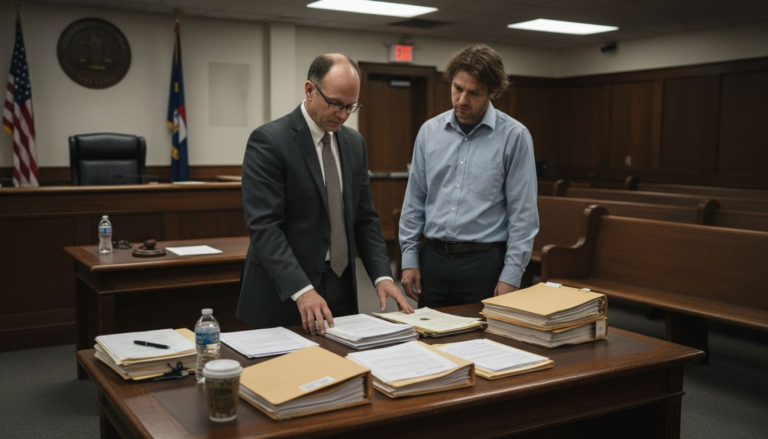If you are pulled over by law enforcement in North Carolina and asked to perform a field sobriety test (FST), you may wonder whether you can refuse. Field sobriety tests are often used by police officers to assess whether a driver is under the influence of alcohol or drugs. These tests typically include activities like walking in a straight line, standing on one leg, or following a pen with your eyes. However, the decision to refuse such tests can have significant legal consequences.
In this blog, we’ll break down your rights when it comes to refusing a field sobriety test in North Carolina, the potential consequences, and what you need to know if you find yourself in this situation.
What is a Field Sobriety Test?
A field sobriety test is a series of physical and mental exercises conducted by law enforcement to determine if a driver is impaired. These tests are subjective and are designed to look for signs of impairment, such as difficulty maintaining balance, swaying, or failing to follow instructions. There are three standardized tests commonly used:
- Horizontal Gaze Nystagmus (HGN) Test: This test requires you to follow a moving object with your eyes, and the officer looks for signs of involuntary jerking in the eyes, which can indicate impairment.
- Walk-and-Turn Test: You must walk a straight line, heel-to-toe, and then turn around and walk back. Difficulty with balance or following the instructions may suggest impairment.
- One-Leg Stand Test: You are asked to stand on one leg and count aloud for 30 seconds. If you sway, stumble, or use your arms for balance, it could indicate intoxication.
Can I Refuse a Field Sobriety Test in North Carolina?
Yes, you can refuse a field sobriety test in North Carolina. It is important to note that field sobriety tests are voluntaryunder state law. This means you are not legally required to perform these tests if asked by a police officer.
However, while you have the right to refuse, there are a few important things to consider:
Consequences of Refusing a Field Sobriety Test in North Carolina
- No Direct Penalties for Refusal: Unlike other tests, such as the chemical breath or blood test, refusing a field sobriety test in North Carolina does not result in an automatic penalty or license suspension. However, refusing a field sobriety test may impact the officer’s ability to establish probable cause to arrest you for driving under the influence (DUI) or driving while impaired (DWI).
- Probable Cause for Arrest: While refusal of a field sobriety test doesn’t result in immediate legal penalties, it could still lead to your arrest if the officer has other evidence of impairment. If you refuse, the officer may still arrest you based on their observations of your driving behavior, appearance, speech, or other signs that suggest intoxication. This could include the smell of alcohol, slurred speech, or erratic driving.
- Impact on DUI/DWI Conviction: Even if you refuse the field sobriety test, a police officer may still arrest you and request a breath or blood test. Under North Carolina’s implied consent law, refusing a chemical test (breath or blood test) after being arrested for DWI will result in an automatic one-year driver’s license suspension, regardless of whether you were intoxicated.
What Happens if I Agree to the Field Sobriety Test?
If you agree to take the field sobriety tests, you should understand that they are subjective, and your performance will be evaluated by the officer. Even if you are not impaired, you might fail the test due to nervousness, medical conditions, or other factors. Failing the test may provide the officer with probable cause to arrest you for DWI.
If arrested, you will likely be asked to take a breath or blood test to determine your blood alcohol content (BAC). If your BAC is above the legal limit of 0.08% in North Carolina, you can be charged with DWI. If your BAC is under the legal limit but you are still impaired by drugs or alcohol, you may still face charges.
What Are the Risks of Refusing a Field Sobriety Test?
While refusing a field sobriety test won’t directly result in penalties, there are still some risks:
- Potential Arrest: Refusing the field sobriety test may make the officer more suspicious, which could lead to your arrest. As mentioned earlier, an officer can still arrest you based on their observations and other evidence of impairment.
- Increased Scrutiny: Officers may view refusal as an indication that you are trying to hide something, especially if you’re acting suspiciously or showing signs of impairment. This can make them more likely to arrest you or ask for a chemical test.
- Difficult to Defend in Court: Refusing a field sobriety test could make it more difficult to defend yourself in court if you are charged with DWI. Even though the field sobriety test is voluntary, the prosecution may argue that refusing the test shows consciousness of guilt.
Should You Refuse a Field Sobriety Test?
The decision to refuse a field sobriety test depends on various factors, including your level of impairment, the circumstances of the stop, and your goals for handling the situation. If you feel confident that you are sober, you may want to perform the tests to demonstrate your innocence. On the other hand, if you are concerned about failing the tests due to nervousness or other factors, refusing the test might be a safer option.
That said, if you are arrested for DWI in North Carolina, you should be aware of the potential consequences of refusing a chemical test (breath or blood test). Refusal of a chemical test will result in an automatic suspension of your license for one year, and this penalty is independent of whether you are ultimately convicted of DWI.
Consult an Experienced DUI/DWI Attorney
If you are facing a DWI charge in North Carolina or have questions about refusing field sobriety tests, it is crucial to consult an experienced attorney. A skilled DWI attorney can help you understand your rights, guide you through the legal process, and provide a strong defense if necessary. Every case is different, and an attorney can help you navigate the complexities of the legal system to achieve the best possible outcome.
Conclusion
In North Carolina, field sobriety tests are voluntary, and you have the right to refuse them. However, refusing the tests may lead to other consequences, such as arrest or heightened suspicion by law enforcement. It’s essential to carefully consider your options and understand the potential risks before making a decision.
If you’re ever in doubt or arrested for DWI, it’s always wise to consult with an attorney who can help protect your rights and ensure the best possible outcome for your case.
If you have been charged with DUI/DWI, it is imperative to contact an experienced criminal defense attorney to help you through your situation. At King & Rowe, PLLC, our criminal defense attorneys are knowledgeable in North Carolina DUI/DWI law and will be able to answer all of your questions and guide you through the court process. Please reach out to us at King & Rowe, PLLC at (828) 466-3858 and allow us to assist you.



